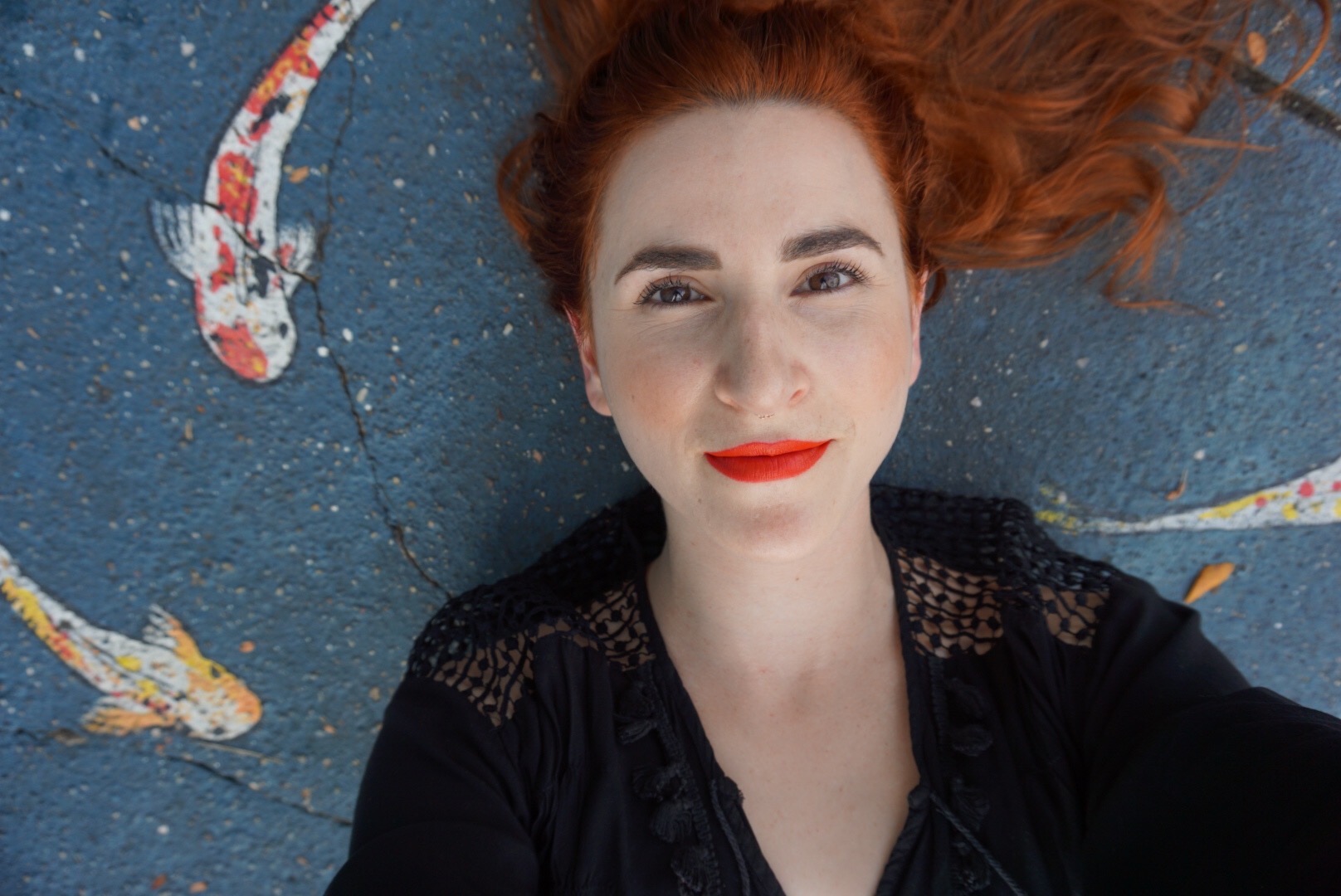
horizontal in Baltimore, Maryland on the sidewalk outside The Charmery in Hampden. Soulful October 2017.
When I was a teenager, and nearly the only place for me to hang out in suburban Florida was my local Barnes & Noble, I found a book called spilling open.
Sabrina Ward Harrison, at the age of 21, published excerpts from her sketchbook, a compressed collage full of self-portraits and color and painted photographs and tender wonderings and frank doubts.
I have carried this book with me through (I counted them on my fingers not so long ago) eleven moves. From high school to dorm room to share to first apartment, across the country to house to apartment to house, back across the country to storage in Dad’s garage to apartment to apartment to community. It still occupies a place of honor in my postage stamp of a room. It’s been four years and counting that I’ve lived at Hacienda Villa. I was sixteen when I found spilling open.
It wasn’t until my 30s that I picked up her second book.
I’m 35 now.
It’s called brave on the rocks.
The narrative begins after the success of her first book, which surprises and overwhelms, more than delights her. The unexpected attention fills her with increasing self-doubt and the pressure to live up to her own image … to the point that she gets an ulcer.
At the top of the book she reprinted a letter from her father. He reminisces about their barefoot walks together along secret trails when Sabrina was a six year-old child.
“The thing about bare feet,” he writes, “is that they move easily and quickly over mud and dirt and sand and grass but tend to hesitate before a barrier of pointy, sharp-edged gravel.”
That summer, her grandfather re-paved his driveway. The first time they approached the edge of it, barefoot, Sabrina held her arms up for a “special carry.”
“But in this situation something told me not to pick you up.” […] “In my mind’s eye I see myself hunker down in front of you and explain the rules of barefoot travel. I told you paths are not always smooth and familiar like the Indian Trail or the good ones out on Pine Ridge. Sometimes there are rocks on the trail and the only way to cross them is to be brave. As I sit here so many years later, I smile when I remember how proudly you walked over the gravel that summer. Whenever we came back to the cottage by way of the Frog Bridge, you would get breathless and boldly announce how you were going to be ‘brave on the rocks.’ Love, Dad.”
I have had many opportunities over the past couple of years to open when I wanted to shut.
***
I don’t use the word “friend” lightly. Friends are people you show up at the hospital for, and who show up for you. Ones you can call in the middle of the night with a crisis of the heart. Ones who bring you rhinestones, ice cream, and pictures of cats when you are in need. And sometimes — much less often — ones for whom I open when I really want to shut. Those are my friends.
I imagine most of us could count these folks on two hands.
The ones you’re willing to have the difficult conversations with. Genuinely hard talks. Where the words don’t come easy. Where you risk the truthfullest truth. The ones where you say, “I don’t think this is the man that you should marry,” or, “I think you need professional help,” or, “Your behavior towards your lovers looks like emotional abuse,” or “I know you’re angry with them, but you didn’t actually make a clear request.”
My friend Julene calls these talks “come to Jesus meetings.” They are one of my primary friendship barometers.
We’re not trained for uncomfortable conversations anymore. Maybe we never were. But I think it’s worse now. It’s got to be. Most of us barely make eye contact these days. We’re out of practice in both social niceties and face-to-face honesty, so every sticky conversation carries the gravitas of an intervention.
I have to really, really care to stage an intervention.
In college, I was kind in love with a guy who was sort of my boss. He was a couple of years ahead of me in school. I did my work study gig at the organization he founded. I remember him telling me once, that someone he admired told him once, that success in life is directly related to one’s ability to have uncomfortable conversations.
I believed it.
I still believe it.
I think about it all the time.
Three years back, I knew I needed to have a “come to Jesus meeting” with my friend. In person. In Portland. I was visiting. I wanted to see her as soon as I arrived, but she delayed. Then postponed. Then delayed again. Our relationship had been shaky at best and distant at most for a couple of months, and I felt in my digestives a rumble of worry and an undercurrent of anxiety over it all.
She was two hours late to meet me.
At first she said she’d be a little late, because her morning hike took longer than expected. Then she pushed it back an hour. Then she said a lot of resistance was coming up in regards to our meeting, and that made her unable to show up on time.
I asked if that was her way of cancelling.
She said “No, no, I’m coming.” Then it took another hour for her to arrive.
During that second hour, I had a come-to-Jesus meeting with myself.
Phrases swirled in my brain like, “devaluing our friendship” and “flaky.” Angry fantasies like, I’m going to send her a text that says simply, “I’m done.” I’ll erase her number. When she gets here, I won’t tell her my exact location so she gets a taste of her own medicine. I’ll remove her from my Facebook. Our friends will still be my friends. And then this winner: No one person’s absence from my life will ruin it.
The angry fantasies were all about how I would shut down. How I could make her feel what I was feeling, so she would share in my hurt.
The thing was, she was hurting too, of course.
Underneath my shouting thoughts, there was a quieter, calmer strand of contemplation, as well. And it said, How about that time she took care of you when you were at your most depleted? You cannot forget that. This is her flakiness. It’s one of the aspects of her personality that you dislike. But you knew that already. Are you going to abandon her now that the flaky has gone direct on you? Also, you chose a motto for this year. You said you would North Star by it. Stay, right? Stay, Lila. Show up. Keep paying attention.
And underneath that there was something else — underneath the shouting thoughts and the quieter contemplation both, the whole maelstrom of my system in tumult, was a steady undercarriage of my spirit that could feel the first touch of sun on my bare spring arms. It breathed the air of so many trees, and did not take for granted their sweetness. This part — for it was this part — counseled love, and the choices made from love. It stood calm in the face of my jittery chest, my tensed solar plexus. This part of me knew things were ultimately ok. I have been excavating this part of me for years, while my emotions hijack my system again and again.
And so I stayed.
***
I have never naturally gravitated towards meditation. When I was 15 years old, I began taking yoga classes. I thought my mom was the one who brought me to yoga, but she tells me that I asked her to take me. The instructor was the only one around for a 30-minute radius, so we drove to Clearwater, Florida, to take classes with him. He would give a dharma talk for the first 10-15 minutes of class, and I would get So. Bored. (He did have a particularly soporific voice.) When will he stop talking so that we can do yoga? I don’t want to sit still with my eyes closed. I want to do stuff with my body!
I carried this disinclination to meditate throughout my yoga teacher training and my first 9ish years of teaching.
And then I took meditation class with a punk. Well, a Buddhist (former Buddhist?) former punk named Ralph de la Rosa. He pulls techniques from all these different traditions and then encourages us, AA-style, to take what works for us and leave the rest. I think the anarchist and the purist are constantly at a game of table tennis inside him, and we get the benefit. (Ralph’s evolving relationship to his sexuality — including his first sex talk, first time, and the celibacy practices of the Hare Krishna — is the subject of this quickie episode of horizontal, 6. divine pleasure: quickie with a meditation teacher.)
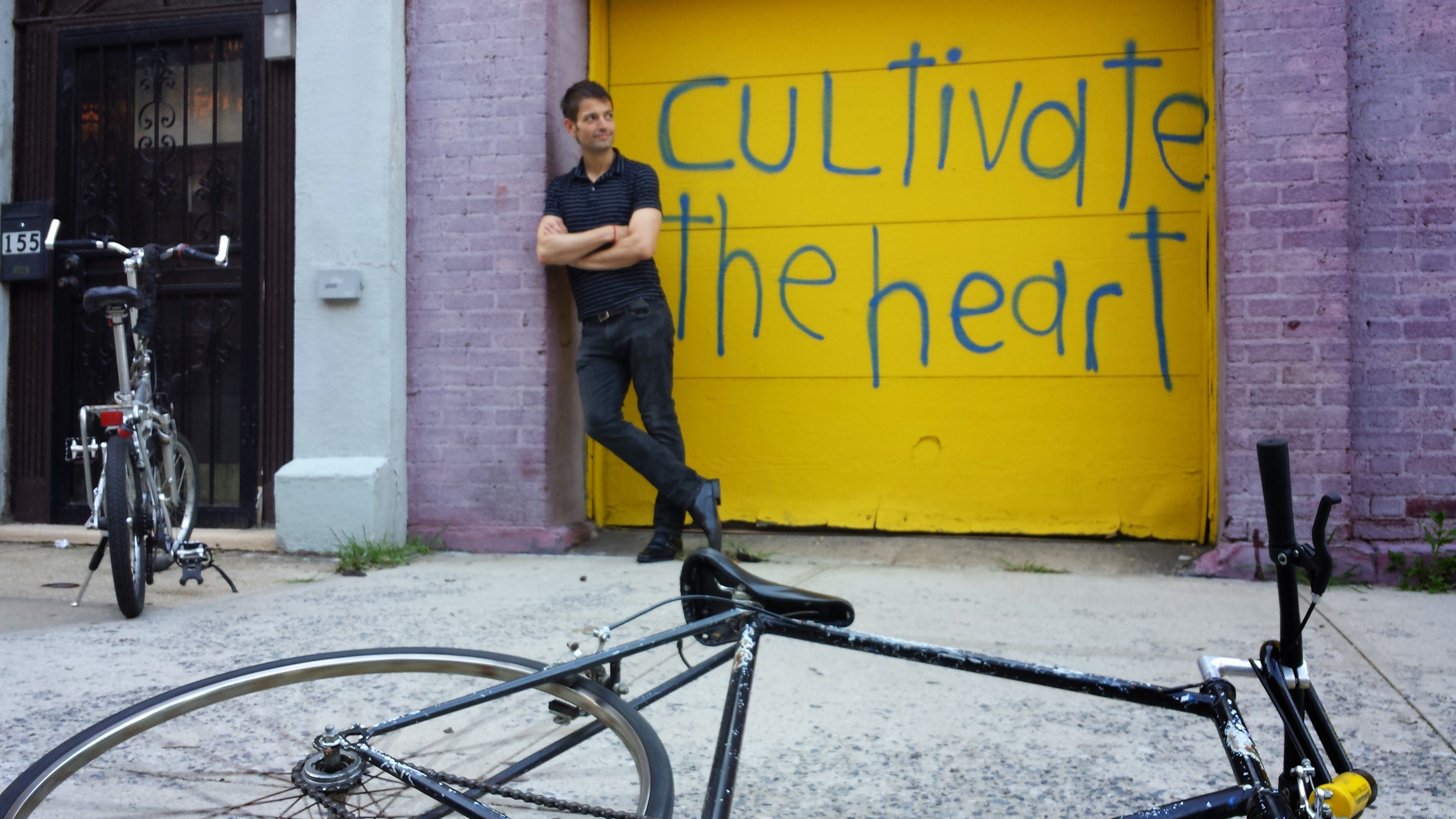
I actually took this image on our first and only date. He thought it was awkward that I wanted to take a photo. But he understood, afterwards. I mean, look at this.
In his class, Ralph reframed my relationship to meditation. One of the methods he taught us laid the foundation for the almost daily — yet brief and un-timed (shocking! lawless!) meditation practice I have now.
Instead of shrinking our awareness down to a laser pointer and focusing the dot on only our breathing, Ralph invited us to expand our awareness … wide, wider, widest, to notice anything that there was to notice. The physical sensations (tension in the legs, warmth in the belly), the sounds in the room (the heater, the cars passing, a few errant birds), concrete things like that, and also the more esoteric things, like our hamster wheel thoughts, our energy level and the timbre of it, our emotional landscape, how connected we feel to other humans. And our breath, yes, that too.
We could also calibrate the volume of our awareness of some of those things by pointing a mental arrow towards them.
Your mind is a circus, he said, I paraphrase. Trained monkeys over there, some bedazzled elephants over here, the trapeze up overhead, a clown up in the stands, somebody always selling peanuts, a big crowd, the lights going, singers singing, and all manner of things to look at. And if your mind is a circus, then there, at center stage, in the very center ring with a spotlight on it, is your breath. You’re not always looking directly at the center ring, necessarily, but you’re always aware that it’s there.
What I got from this was the sense that I didn’t need to discard anything in order to meditate.
[Also, I LOVE THE CIRCUS.]
My awareness was wide enough, I saw. It could blanket everything and anything that entered, without trying to turn things aside.
Whenever I practiced more austere modes of meditation, I felt like a curmudgeonly card player, continually discarding. Like my thoughts were bum cards, hindering my hand. And I had to put them down, over and over again, nearly every second. I had to label them “thinking,” and put them in the discard pile. I was failing at the task every moment. I did not cultivate the gentleness to temper the precision, as Pema Chodron advised. It felt like a punishing practice that turned my mind into a disciplinarian, taking my mind to task. I found it unreasonably exhausting. Perhaps it is simply too rigorous for the way I wish to live my life. I am also willing to entertain the idea that I am a bit lazy. You could say that I wanted the benefits without the discipline. You would mostly be right.
But also, I don’t think there is One Size Fits All for pretty much anything on the planet, so why would it work for meditation?
The center stage analogy really did something for me. I started to characterize my mind as a full-on circus, not just some hyperactive monkey. My mind is an incredible menagerie. I’m proud of all the sights to be seen on the inside of my brain. I don’t want to tame them away. I cherish them. It seems to me that the menagerie is the primary source of my inspiration.
Meditation people are always talking about the “monkey mind.” These schools of thought characterize our minds as children with hyperactive disorders.
I prefer the circus. I like this more benevolent way of regarding my mind: as a beautifully-choreographed mess with its own inherent logic. Dangerous and smelly things are happening, yes. Also, incredible feats of graceful prowess, catchers making connection with their flyer’s arms at seemingly the last moment. And yet, in the very center ring … with a spotlight on it … in the middle of my beautiful circus … is my breath. This doesn’t mean I can’t see the elephants. It means that the arrow points to the center ring, and I am big enough to encompass all of it.
Breath in the center ring.
***
In the middle of downtown Portland, I checked in with myself.
I felt anxiety. I inquired deeper. What’s the anxiety made of? If I didn’t have a story attached to the feeling, would it still be unpleasant?
It wouldn’t be unpleasant, it would feel almost like … excitement.
I identified my anxiety as acidic excitement.
I curled up on a ledge in the park. I waited. And I began to meditate. And write. Meditate and write. Breath in the center ring. I would close my eyes and feel the sweetness of my breath and before too long, a sentence I could not deny would well up inside me and demand expression on paper and I would give it form and then close my eyes again. I felt like Dumbledore removing silvery strands of memory and placing them in the Pensieve so that Harry could see them. I wrote:
Decide that she’s worth it. That friendship is worth it. That turning towards love is worth the effort. It’s the only true nobility in the world, turning towards love. Livid and bruised and in pain. It’s so easy to say “fuck you.” It’s so much harder and more beautiful to say, “I see that you’re in pain. I am too.”
She arrived. I felt my reptile brain coil, prepare to strike. To demand an apology! To say that I’d been there for a whole hour waiting! I knew though. I knew that this would not be conducive. I knew that this would not give me what I really wanted.
My smile didn’t come right away, so, I did not smile. But we embraced. And then we began to walk. There’s a way that a walk-and-talk is like a road trip. It carves a path for the difficult conversations. Mostly we look straight ahead. Occasionally we glance over, but not too long, so we don’t crash into anything. And we’re moving. With a sense of getting somewhere, we talk. I think this is why I like writing on trains and buses so much.
We found a place to sit. I gave her a gift. She gave me an apology, which was also a gift. We spent the following day together, nourishing our friendship by/and telling the truth.
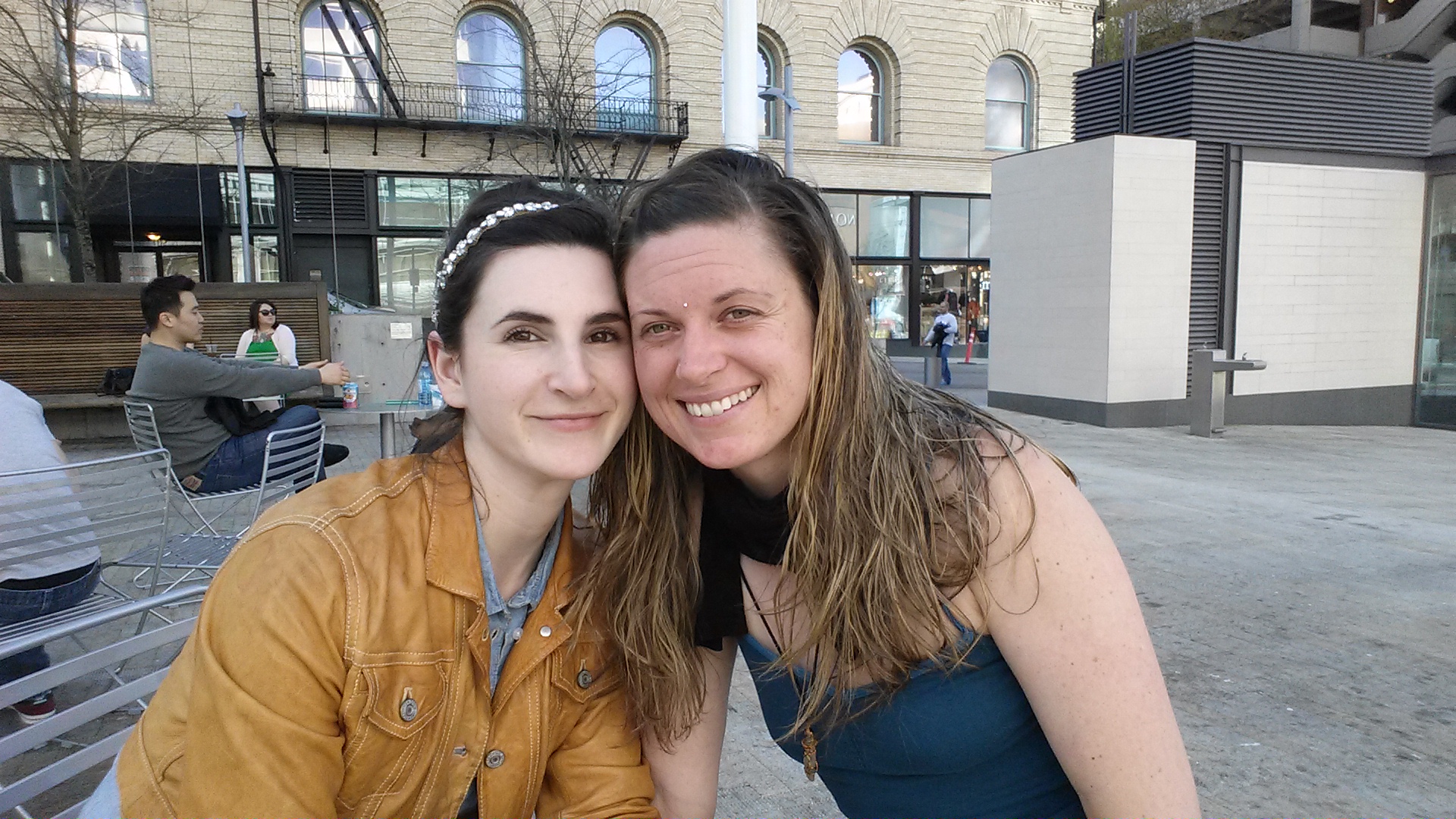
This is what it looked like after we spoke.
***
Later in the trip, alone in an airbnb booked for two, teeth-chatteringly angry and nauseatingly sad, I resisted a come-to-Jesus meeting for another relationship. With my lover. Her…suitor?
My relationship with him made both of the meetings necessary.
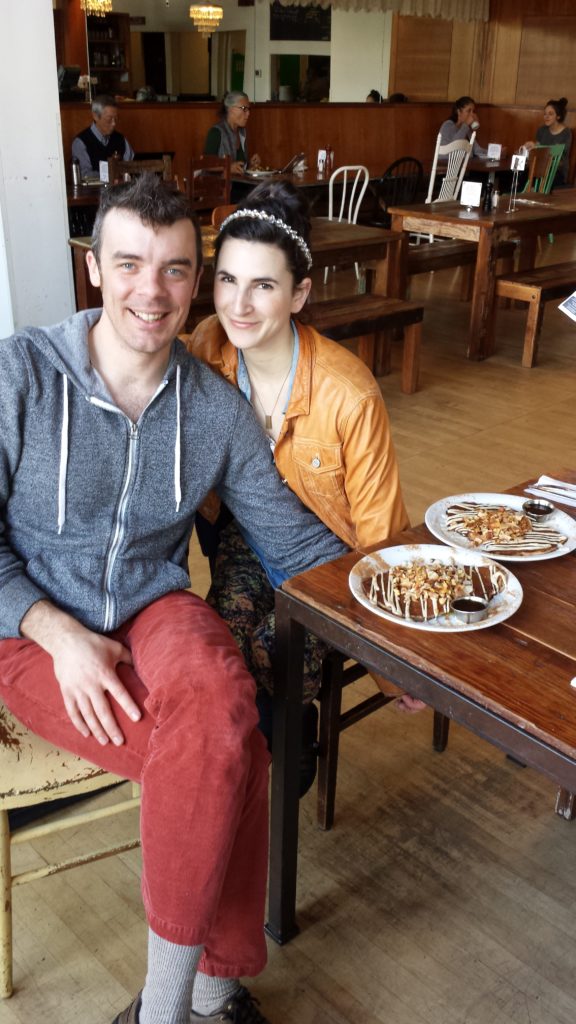
Before the meetings.
On the day she and I spent together, nourishing our friendship and/by telling the truth, she showed me a message from him. Something like I got so turned on when I saw you today. When Lila and I wrap up our relationship and she goes back to New York, I’d really like to explore us.
I took the rental car and went to the coast by myself.
I was supposed to pick him up. We were planning to have a romantic weekend at the beach. I didn’t pick up him. I didn’t even tell him I was going. Or not going. He can find his own way back, I fumed. I cannot recall another time when I have been this livid. Were I a cartoon character, there would have been steam coming out of every orifice.
I met his text messages with aggressive silence. I could barely eat. My fine organic groceries went untouched in the fridge. When my stomach got ferocious, I ate a handful of berries. I walked on the beach. I meditated on the rocks. I watched a movie on the VCR. It had a VCR. I ate a handful of berries.
Pacing at 11pm on the second floor of the house, a-writhe with rage, I called my friend Matthew Stillman. I called Matt because I was sure that he would counsel me to open instead of to close. I stood in the only crevice of that house where I could get cell phone service — pressed up against the floor-to-ceiling window, and the phone rang long. He answered it in the voice of the half-asleep and I realized all at once that it was 2am in New York and I cried with anger and cried with the pain of not being chosen and cried to have woken my friend in the middle of the night. He shook himself awake in seconds when he heard my voice crack.
“I’m here,” he said. “I’m here.”
“I’m so sorry I woke you up,” I said.
“It’s okay,” he said. “I’m here.”
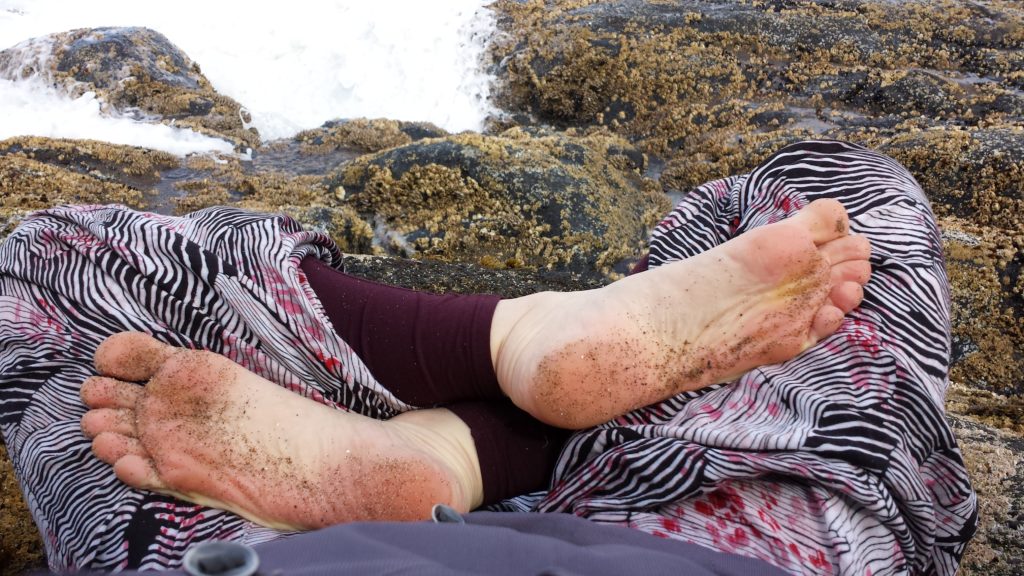
About to sit with my anger on the rocks. Literally.
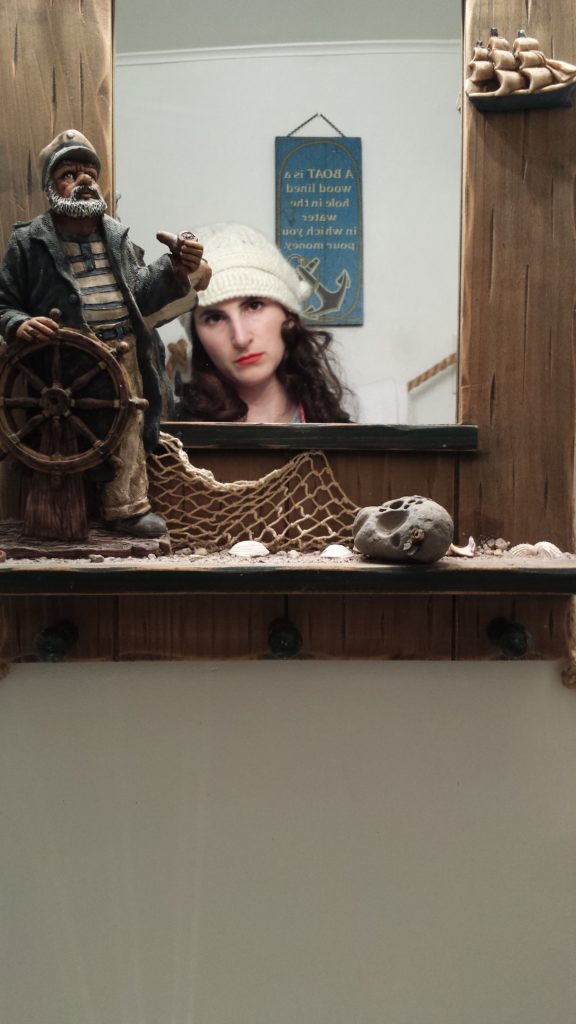
I took this bathroom portrait in that airbnb. I’ve never shown it to anyone before.
I vomited up the story, still pressed against the glass, relentless snot and tears mixing and dripping down my hand.
He heard it all.
Then he said, “You have to give him the gift of your anger.”
“It’s so hard to see it as a gift,” I said.
“I know. But it is. It is sacred rage. Your deep feeling, your sensitivity, is your gift.”
“What’s sacred about it?”
“It’s pure. Like a 12 year-old in their room, raging at God and screaming ‘It’s not fair!’”
I didn’t really understand it then.
I barely understand it now.
But I heard it. I felt it. And after a sleep, I answered one of the messages.
The next day I drove the rental back to Portland and raged sacred at him in the passenger seat of his parked car.
If I hadn’t, we would have no connection now.
***
About an hour after that, all three of us had a come to Jesus meeting.
My friend suggested that we do an exercise called “Beginning anew.” She learned it from the followers of Thich Nhat Hanh. It is a series of four deceptively simple, ingeniously curated prompts:
- What I appreciate about you…
- Where I fell short…
- When I felt hurt…
- How you can help…
We sat at Harlow, my favorite Portland restaurant, and actively opened when we wanted to close but really knew it would be better if we opened.
It’s not that it wasn’t painful.
It’s that it was worth it.
Our relationships have never been the same, but relationships we have.
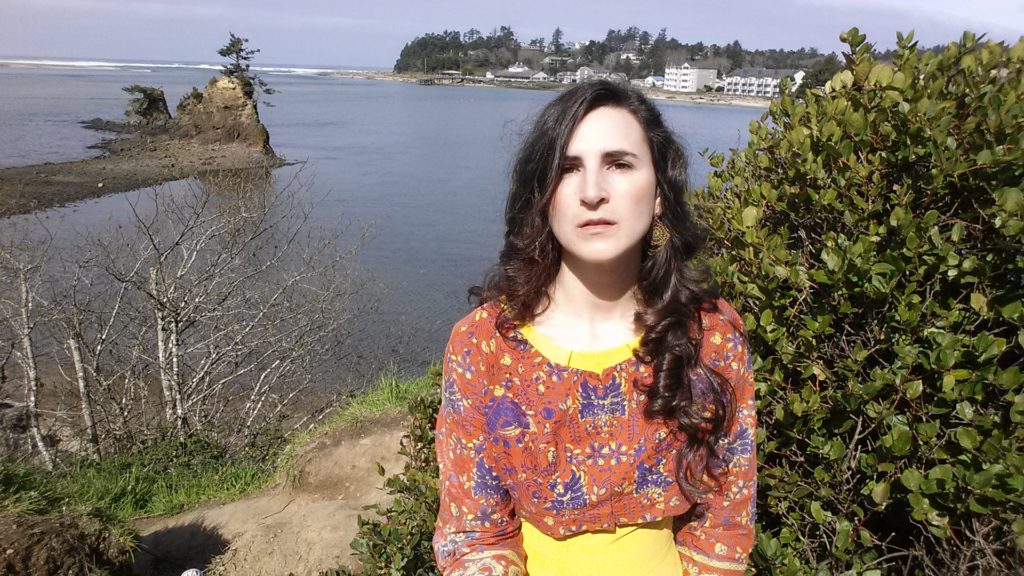
I stopped on the road on the way back, before I spoke to him, and took this self-portrait.
***
Sometimes, when I tune in, I notice that a pop song has been playing in my head. On repeat.
That day it was “Do It Again,” by Nada Surf.
These lines, mainly:
maybe this weight was a gift / like I had to see what I could lift
They don’t get enough credit, I thought. Well done Nada Surf.
***
Being brave on the rocks means choosing to engage with the pointy and feels its pressure, rather than desensitize ourselves.
As I like to tell my yoga students: “You can pretend that it’s not happening, but it won’t help. You might as well show up inside it, pay attention, and breathe as deeply as you can. This pose is not a life skill. Breathing deeply in difficult situations, is. Now that’s useful.”
The sensation will probably be intense. The rocks may very well be sharp. We’ll have to pay a lot of attention. Even so, with all our attentiveness, we might get cut. Or bruised. Choosing to open does not bypass the hurt. It gives us the opportunity to digest it. Because the alternative — to disengage, by means of alcohol, junk food sex, sugar, television, or any of the myriad drugs we use to numb it out — when we hold our arms up for that “special carry,” we relinquish growth.
***
I saw an image of myself: as both flower and farmer.
It was dusk, impending night, and my petals wanted to close. That’s what petals do, by instinct.
The human me placed my own fingers on the inside of the petals, and, with insistent gentleness, did not allow them to shut.
May we choose to be brave.
On the rocks.
